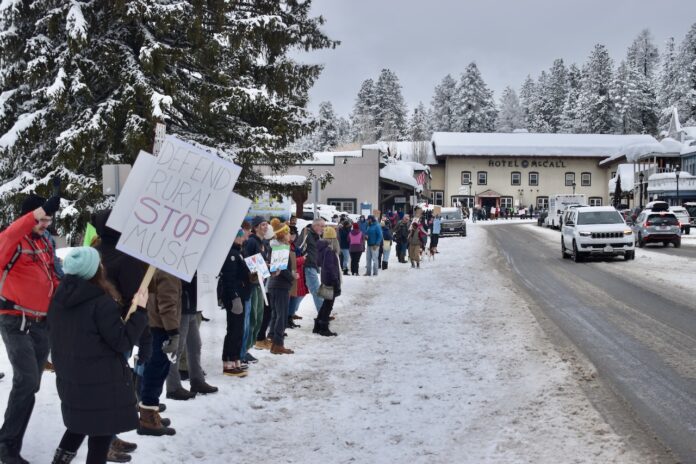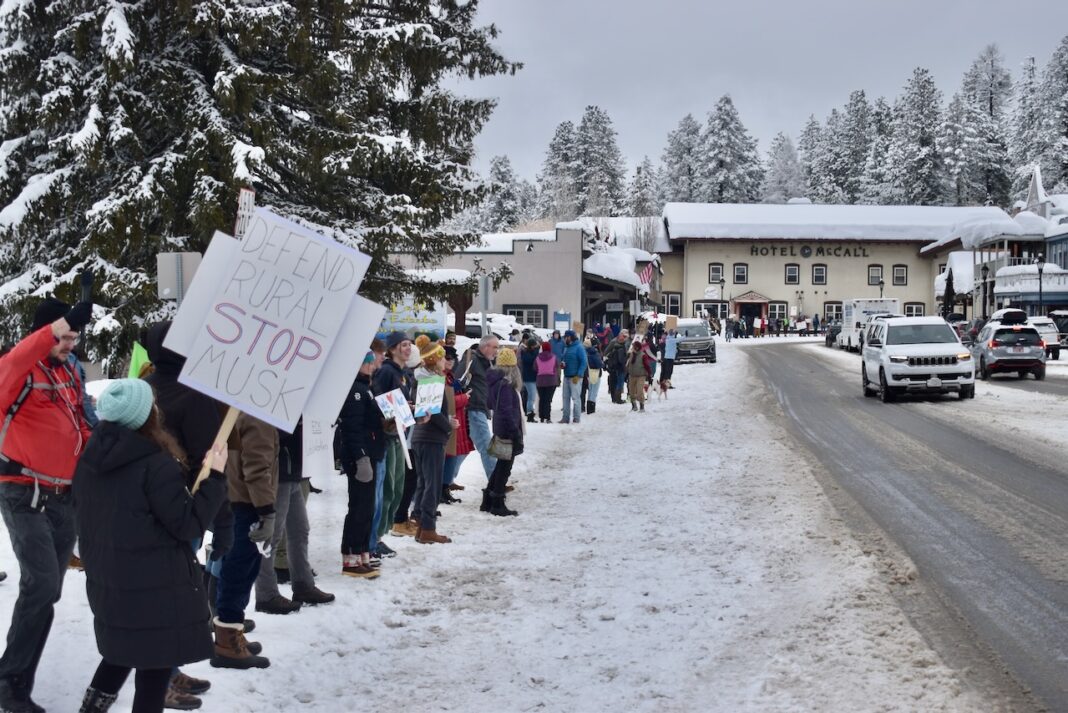Bryce Spare has his job back—for now.
Spare is among 61 fired probationary employees on the Payette and Boise national forests who were re-instated this week by the United States Department of Agriculture after being fired last month as part of federal workforce cuts initiated by the Department of Government Efficiency.
The reinstatement means the employees are being paid again and will be compensated with backpay to when they were fired in February. An actual return to duty, however, remains unclear.
“The Department will quickly work to develop a phased plan for a return-to-duty, and while those plans materialize, all probationary employees will be paid,” according to an unsigned USDA statement released on Tuesday.
Spare, a backcountry ranger based on the McCall and New Meadows districts, is relieved to be receiving paychecks again and hopeful to resume his duties soon. But he is skeptical it will last.
The Merit Systems Protection Board ruling that led to the re-instatements only guarantees fired probationary employees employment through April 18. That timeline could be extended, but the long-term future of probationary employees like Spare remains unclear as the legal process continues to play out.
Meanwhile, a separate federal workforce reduction effort was announced on Feb. 26 by the Office of Personnel Management, the same agency that initiated the firings of probationary employees.
That effort, known as “reduction in force,” required federal agencies to submit plans yesterday for further workforce reduction, particularly by “eliminating functions that are not statutorily mandated.” The impacts of those plans are currently unknown.
“I’m still very concerned about the impact that potential reduction force actions are going to have on this area and kind of on all public lands,” Spare said.
Employees face tough decisions
Working for the Payette remains Spare’s first choice, but the uncertainty facing the agency leaves him and other fired probationary employees with a tough choice.
“Some people unequivocally, they want their jobs back,” said Emma Baker, a McCall resident who was fired from her job with the Payette as a wildlife technician. “But a lot of people are also saying that they’d be really nervous to take their jobs back.”
Like Spare, Baker’s first choice was to remain with the Payette. She fell in love with the McCall area in 2023 while working a seasonal fisheries job with the Payette. She returned in 2024 to work in the Payette’s wildlife division.
Without donors like you, this story would not exist.
Make a donation of any size here
Baker was furloughed in November for the winter and returned home to Kentucky until she was told to report back for duty on Feb. 10. On Feb. 14, she was fired.
“I spent all the money to drive back out here to lose the job,” she said.
Despite this week’s re-instatement, Baker has already moved on. She recently accepted a position with Colorado Parks and Wildlife that begins in late April.
“At this point, I’m committed to Colorado because I don’t trust that I won’t just be laid off again,” Baker said. “I think that’s how a lot of people feel.”
Sidney Noble, a botanist with the Payette who was fired on Feb. 16, is encouraged by his recent re-instatement, but like other probationary employees still does not know when he will return to duty or if his job will continue beyond April 18.
“It’s been pretty rough this past month,” Noble said. “In order for my wife and I to just have enough money to get by, I took a job as a lift operator at Brundage.”
Noble has also applied to other natural resources jobs over the last month amid the uncertainty shrouding his long-term employment with the Payette.
“There’s no place I would rather work, still,” he said. “But I want to use my PhD, whether that’s for the federal government or elsewhere.”
‘Cloud of uncertainty’ widespread
Sara Kososik, a union representative for the Payette, Boise, and Salmon-Challis national forests, told Valley Lookout the uncertainty described by Spare, Baker, and Noble is widespread across the Forest Service.
Shock, anger, confusion, uncertainty, depression, fear, and loneliness are among the range of emotions Kososik has seen over the last month through her work with the union.
“There’s a lot of mental calculation that people are having to do right now, both people who are terminated and who are currently employed,” Kososik said. “This cloud of uncertainty, it’s hanging over all our heads right now.”
Kososik estimates that 10% of the 42 fired probationary employees have already moved on to other jobs due to the long-term uncertainty, with more potentially on the horizon.
Meanwhile, she described a “feeling of trepidation” in Payette offices as broader reduction in force initiatives loom.
“We’re still working, we’re still laughing,” she said. “But every so often it hits and the office gets quiet and kind of subdued feeling. It’s rough days at work for sure.”
Kososik said the last few months have been especially difficult because the Forest Service is a labor of love for so many employees. Political narratives surrounding the federal workforce cuts have felt personal for Kososik and others.
“People that work in the civil service are not lazy, trough-feeding government workers that politics have painted us to be,” she said. “This job is a large part of who I am as a person. That, I think, is a really common vein in the Forest Service. We do this because we love it.”






